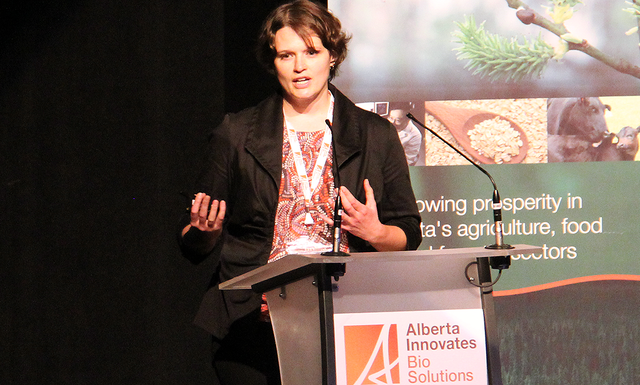Living Laboratories at Impact Innovation 2015

Can plants be used to clean up hydorcarbon spills? Can we better model the likelihood of forest fires? Can we restore your wetland?
One of those questions is currently at the heart of an ALI multi-year research project; the others are being explored through research supported by one of our Institute’s most valued partners: Alberta Innovates Bio Solutions –– AI Bio.
AI Bio is a research agency funded by the Government of Alberta. In collaboration with partners like ALI, it invests in science and innovation to grow prosperity in Alberta’s agriculture, food and forest sectors, by helping to develop new technologies, products, services or industry practices. Its areas of focus are sustainable production, bioindustrial innovation, food innovation, prion diseases, and ecosystem services.
The ecosystem services focus made AI Bio a natural partner for ALI when it came to launching the Alberta’s Living Laboratories Wetlands Project. Along with government and other stakeholder partners, the agency has provided support which is helping the project's research team get into the field, and inventory and analyze the drained wetlands in Rocky View County. This morning, Dr. Shari Clare represented the entire research team at special AI Bio public event.
Impact Innovation 2015 marked the fifth edition of AI Bio’s popular public outreach speaker session. Hosted by writer and broadcaster Jay Ingram, the event allows representatives from government, stakeholders, and members of the public to learn about some of the many projects currently receiving AI Bio’s support. This year, 250 people attended the event in person, while audiences from across the province (and beyond) were able to tune in via a live webcast.
Dr. Clare presented the Alberta’s Living Laboratory project, explaining how the research team will seek to restore wetlands in the Nose Creek watershed, and in the process gain a better understanding of the true cost of restoration –– including land owner compensation.
Researchers from five other projects also took the stage; Dr. Mike Flannigan, Dr. Lynn McMullen, and Dr. Ted Allison from the University of Alberta, as well as Alberta Tech Futures' Dr. Behzad Ahvazi, and Dr. Barbara Zeeb from the Royal Military College of Canada. Information about these projects, and videos of each presentation, can be found at the AI Bio Impact Innovation 2015 website.
The Alberta Land Institute is fortunate to benefit from numerous partnerships, both inside and outside the research community. Like many organizations, we’ve truly enjoyed our strong relationship with AI Bio, and we look forward to continued work together in years to come.
For more information about AI Bio, visit their website.
For more information about the Alberta’s Living Laboratory Wetlands Project, visit the project page, and consult the project backgrounder.